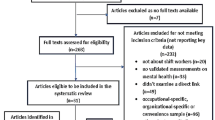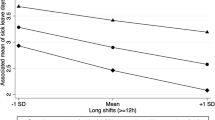Abstract
Objectives
To investigate whether work-time influence moderated the effect of shift work on psychological well-being measured as vitality, mental health, somatic stress symptoms, and disturbed sleep.
Methods
We used questionnaire data from 2,148 health care workers who finished their education in 2004 and were followed during their first 2 years of employment in the eldercare and health care sectors. We analyzed the effect of shift work, work-time influence, and the combination of these two variables adjusted for differences in baseline psychological well-being, background factors, and psychosocial work environment.
Results
Surprisingly, in this cohort, shift workers had higher vitality and better mental health than day workers. The combination of shift work and moderate or low work-time influence was associated with lower vitality, worse mental health, and more somatic stress symptoms than would have been expected when adding the separate effects of working hours and work-time influence. Work-time influence did not have any effect among day workers.
Conclusion
Shift workers appear to be especially vulnerable to the negative effect of moderate or low work-time influence.
Similar content being viewed by others
References
Åkerstedt T (2003) Shift work and disturbed sleep/wakefulness. Occup Med (Lond) 53:89–94
Åkerstedt T, Knutsson A, Westerholm P, Theorell T, Alfredsson L, Kecklund G (2002) Sleep disturbances, work stress and work hours: a cross-sectional study. J Psychosom Res 53:741–748
Ala-Mursula L, Vahtera J, Pentti J, Kivimäki M (2004) Effect of employee worktime control on health: a prospective cohort study. Occup Environ Med 61:254–261
Ala-Mursula L, Vahtera J, Linna A, Pentti J, Kivimäki M (2005) Employee worktime control moderates the effects of job strain and effort-reward imbalance on sickness absence: the 10-town study. J Epidemiol Community Health 59:851–857
Ala-Mursula L, Vahtera J, Kouvonen A, Väänänen A, Linna A, Pentti J, Kivimäki M (2006) Long hours in paid and domestic work and subsequent sickness absence: does control over daily working hours matter? Occup Environ Med 63:608–616
Baltes BB, Briggs TE, Huff JW, Wright JA, Neuman GA (1999) Flexible and compressed workweek schedules: a meta-analysis of their effects on work-related criteria. J Appl Psychol 84:496–513
Bildt C, Michelsen H (2002) Gender differences in the effects from working conditions on mental health: a 4-year follow-up. Int Arch Occup Environ Health 75:252–258
Bøggild H (2009) Settling the question—the next review on shift work and heart disease in 2019. Scand J Work Environ Health 35:157–161
Bøggild H, Knutsson A (1999) Shift work, risk factors and cardiovascular disease [review]. Scand J Work Environ Health 25:85–99
Bøggild H, Burr H, Tüchsen F, Jeppesen HJ (2001) Work environment of Danish shift and day workers. Scand J Work Environ Health 27:97–105
Costa G, Sartori S, Åkerstedt T (2006) Influence of flexibility and variability of working hours on health and well-being. Chronobiol Int 23:1125–1137
Geiger-Brown J, Muntaner C, Lipscomb JA, Trinkoff AM (2004) Demanding work schedules and mental health in nursing assistants working in nursing homes. Work Stress 18:292–304
Hallman T, Burell G, Setterlind S, Oden A, Lisspers J (2001) Psychosocial risk factors for coronary heart disease, their importance compared with other risk factors and gender differences in sensitivity. J Cardiovasc Risk 8:39–49
Hughes E, Parkes KR (2007) Work hours and well-being: the roles of work-time control and work-family interference. Work Stress 21:264–278
Jansen NW, van Amelsvoort LG, Kristensen TS, van den Brandt PA, Kant IJ (2003) Work schedules and fatigue: a prospective cohort study. Occup Environ Med 60(suppl 1): i47–i53
Joyce K, Pabayo R, Critchley JA, Bambra C (2010) Flexible working conditions and their effects on employee health and wellbeing. Cochrane Database Syst Rev 2:CD008009
Kandolin I (1993) Burnout of female and male nurses in shiftwork. Ergonomics 36:141–147
Kandolin I, Huida O (1996) Individual flexibility: an essential prerequisite in arranging shift schedules for midwives. J Nurs Manag 4:213–217
Kandolin I, Härmä M, Toivanen M (2001) Flexible working hours and well-being in Finland. J Hum Ergol (Tokyo) 30:35–40
Knutsson A, Åkerstedt T (1992) The healthy-worker effect: self-selection among Swedish shift workers. Work Stress 6:163–167
Kristensen TS, Hannerz H, Hogh A, Borg V (2005) The Copenhagen psychosocial questionnaire–a tool for the assessment and improvement of the psychosocial work environment. Scand J Work Environ Health 31:438–449
Lowden A, Åkerstedt T (2000) Introduction of self-selected work hours in retail work—effects on work satisfaction, health and social life. Arb Wiss 54:300–305
Nabe-Nielsen K, Garde AH, Tüchsen F, Hogh A, Diderichsen F (2008) Cardiovascular risk factors and primary selection into shift work. Scand J Work Environ Health 34:206–212
Nabe-Nielsen K, Tüchsen F, Christensen KB, Garde AH, Diderichsen F (2009) Differences between day and nonday workers in exposure to physical and psychosocial work factors in the Danish eldercare sector. Scand J Work Environ Health 35:48–55
Nabe-Nielsen K, Kecklund G, Ingre M, Skotte J, Diderichsen F, Garde AH (2010) The importance of individual preferences when evaluating the associations between working hours and indicators of health and well-being. Appl Ergon 41:779–786
Pejtersen JH, Kristensen TS, Borg V, Bjorner JB (2010) The second version of the Copenhagen psychosocial questionnaire. Scand J Pub Health 38:8–24
Pryce J, Albertsen K, Nielsen K (2006) Evaluation of an open-rota system in a Danish psychiatric hospital: a mechanism for improving job satisfaction and work-life balance. J Nurs Manag 14:282–288
Puttonen S, Härmä M, Hublin C (2010) Shift work and cardiovascular disease—pathways from circadian stress to morbidity. Scand J Work Environ Health 36:96–108
Rothman KJ, Greenland S (1998) Modern epidemiology. Lippincott-Raven Publishers, Philadelphia
Setterlind S, Larsson G (1995) The stress profile: a psychosocial approach to measuring stress. Stress Med 11:85–92
Tucker P, Knowles SR (2008) Review of studies that have used the Standard Shiftwork Index: evidence for the underlying model of shiftwork and health. Appl Ergon 39:550–564
van Amelsvoort LG, Schouten EG, Kok FJ (2004) Impact of one year of shift work on cardiovascular disease risk factors. J Occup Environ Med 46:699–706
Viitasalo K, Kuosma E, Laitinen J, Härmä M (2008) Effects of shift rotation and the flexibility of a shift system on daytime alertness and cardiovascular risk factors. Scand J Work Environ Health 34:198–205
Ware JE Jr, Kosinski M, Bjorner JB, Turner-Bowker DM, Gandek B, Maruish ME (2007) User’s manual for the SF-36–v2TM health survey. QualityMetric Incoporated, Lincoln, RI
Wirtz A, Giebel O, Schomann C, Nachreiner F (2008) The interference of flexible working times with the utility of time: a predictor of social impairment? Chronobiol Int 25:249–261
Acknowledgments
This study was financed by the national budget through a special three-year grant to the SOSU research programme at the National Research Centre for the Working Environment.
Conflict of interest
The authors declare that they have no conflict of interest.
Author information
Authors and Affiliations
Corresponding author
Rights and permissions
About this article
Cite this article
Nabe-Nielsen, K., Garde, A.H., Albertsen, K. et al. The moderating effect of work-time influence on the effect of shift work: a prospective cohort study. Int Arch Occup Environ Health 84, 551–559 (2011). https://doi.org/10.1007/s00420-010-0592-5
Received:
Accepted:
Published:
Issue Date:
DOI: https://doi.org/10.1007/s00420-010-0592-5




